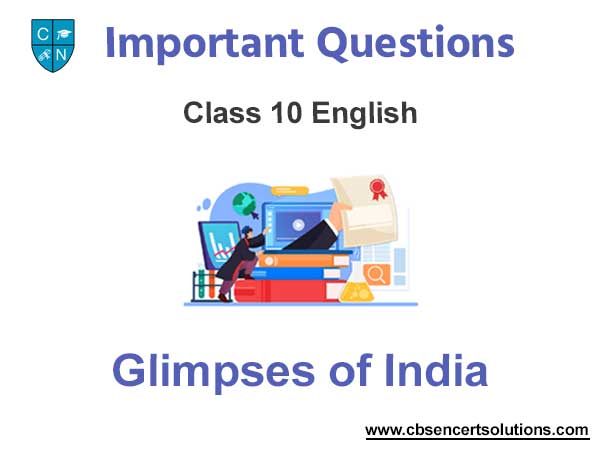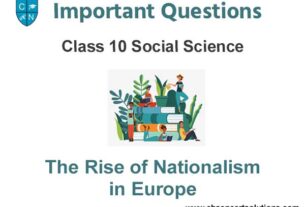Please refer to Glimpses of India Class 10 English Important Questions given below. These solved questions for Glimpses of India have been prepared based on the latest CBSE, NCERT and KVS syllabus and books issued for the current academic year. We have provided important examination questions for Class 10 English all chapters.
Class 10 English Glimpses of India Important Questions
Short Answer Type Questions
Question. How did the baker make his musical entry?
Ans. The baker made his musical entry with the ‘jhang, jhang’ sound. It was made by a bamboo staff. One hand supported the basket on his head. The other banged the bamboo on the ground. He would greet the lady of the house and would place his basket on the vertical bamboo, to sell the bread.
Question. What is bol? What different things were made by the ladies of the house for different occasions?
Ans. Bol is the sweet bread. It is a marriage gift and an integral part of a party. Any party loses its charm without it. The lady of the house must prepare sandwiches for the daughter’s engagement. Cakes and Bol in has are a must for Christmas and other festivals. These are traditional dishes.
Question. He, his family and his servants always looked happy and prosperous. Their plump physique was an open testimony to this. Even today any person with a jackfruit-like physical appearance is easily compared to a baker.
(a) Why was anyone with a jackfruit-like physical appearance compared to a baker?
(b) The bakers were prosperous people and their families always looked happy. The line seems a remnant from childhood observations. Comment.
Ans. (a) The bakers were rich people who had ample of bread to eat and enjoy. Thus, they often looked well-fed and happy. In fact, the bakers never bothered with daily money, they always maintained monthly accounts.
(b) The bakers were prosperous because they always had consumers. The bread loaves are famous and a staple for people in Goa. The sentence seems like an observation from childhood because he uses terms like “they always looked well-fed and happy”.
Question. Describe Coorg or Kodagu geographically.
Ans. Coorg or Kodagu is the smallest district of Karnataka. It has evergreen rain forests. These are very suitable for growing spices and coffee plantations. There is coffee flavour in its air. A lot of coffee estates and colonial bungalows stand here. They are tucked under tree canopies in main corners.
Question. Describe the animals that can be seen here in Coorg.
Ans. The place is just ideal for different kinds of animals. They reside in these forests. Birds, bees and butterflies. Macaques, Malabar squirrels, langurs and slender loris can be seen any time. They keep a watchful eye over every person from the tree canopy. In addition, there are wild elephants also.
Question. What ‘magnificent view’ did Rajvir see outside while going in the train?
Ans. There were tea bushes here and there. Against the densely wooded hills, a sea of tea bushes spread over a vast area. Over the tiny tea plants were tall sturdy shade-trees. There were orderly tea bushes. In the distance was an ugly building. It looked odd among the tea bushes. Smoke was coming out of tall chimneys.
Question. What did Mr. Barua, Pranjol’s father, tell about tea bushes?
Ans. Mr. Barua received both Rajvir and Pranjol at the cottage. He told Rajvir and Pranjol that it was the second-flush or sprouting period. It lasted from May to July. It gave out the best tea, said Rajvir, He told that he had done his homework before coming. He had a good knowledge about tea.
Question. Why was Pranjol not excited on seeing the tea garden?
Ans. Pranjol was born and brought up in Assam. He had been watching the tea gardens since his childhood. There was nothing new for him. So he was not excited on seeing the tea gardens.
Question. What do the elders in Goa still love to remember ?
What are the elders in Goa nostalgic about ?
Ans. The elders in Goa are nostalgic about the good old Portuguese days and the Portuguese loaves of bread. The Portuguese were very famous for their bread.
Question. What did the bakers wear when the author was young ?
Ans. The bakers in the Portuguese days wore a peculiar dress called the ‘Kabai’. It was a long single piece of frock reaching down to the knees. During the years when the author was young, they wore a shirt and a trouser that used to be longer than a half pant and shorter than a full pant.
Question. How did the baker attract the children ?
Ans. The baker attracted the children not by his jingle or by the loaves of bread he sold but attracted the children by the bread bangles or the special sweet bread he sold, especially made for children.
Long Answer Type Questions
Question. Write a paragraph on Coorg.
Ans. Coorg is the smallest district in Karnataka, situated about 250 kms near Bangaluru. It is situated between Mysore and Mangalore. There are hills all around the town which appears like a piece of heaven broken down from the Kingdom of God. It is the land of the brave martial clan of the Kodavus. There are coffee plantations in the area. The Coorgis are very hospitable people. They are a brave community with the first Army Chief of our country being a Coorgi. The flora and fauna of the area is unique and one can easily encounter elephants, Malabar squirrels, langurs, loris, etc. The best time to visit Coorg is from September to March when the rains have stopped. Coorg is also a haven for adventure sport enthusiasts.
Question. How did the baker, known as pader, announce his arrival?
Ans. The baker in the author’s childhood days used to come twice a day. In the morning, he came to sell the loaves of bread and in evening, he returned after emptying his huge basket. He would come again with the ‘jhang, jhang’ sound of his special bamboo stick. One hand supported the basket on his head while the other banged the bamboo on the ground. The baker would greet everyone with ‘Good morning.’ He would place the basket on the vertical bamboo. The author and other children would peep into the basket. They loved bread-bangles. Sometimes, it was a sweet bread of special make.
Question. We kids would be pushed aside with a mild rebuke and the loaves would be delivered to the servant. But we would not give up. We would climb a bench or the parapet and peep into the basket, somehow. I can still recall the typical fragrance of those loaves.
(a) Who has brought this basket? What is special about this activity?
(b) The children would be pushed aside but they still manage to peep into the basket. What were they so eager to see?
Ans. (a) The baker (pader) has brought this basket full of fresh loaves of bread. This is a daily activity and he makes two rounds each day. The activity is special because these paders are carrying on the old Portuguese tradition. (b) The children were always eager for the bangle bread loaves that the baker would carry along with him. Sweet to taste, the bread always took the children’s fancy.
Question. Describe the childhood memories of the author’s time in Goa and his fondness for breads and cakes ?
OR
The author shares a lot of information about the bakers in his home town when he was young. He appears to be a very observant child. Should children have such keen observation powers?
AnsThe author tells us that bread is an indispensable part of the life of the Goan people since the time of the Portuguese. Bread is a part of not only everyday life but also of festive occasions and events. For each occasion there was a special kind of bread. He also tells us that the baker had leading role in the society was so important in the life of the Goans that they got up with the jingling sound of his bamboo. He also tells us that the baker wore either a Kabai, i.e., a long frock or a shirt and a half pant like trousers.
The author seems to be very observant because not only does he know all this but also knows the profit-making in it as he says that in those days, the baker was very prosperous and never starved. He also knew that they maintained monthly bills on the walls. Such strong observation powers would definitely be beneficial for children as they would become aware of the citizens of their neighbourhood.



